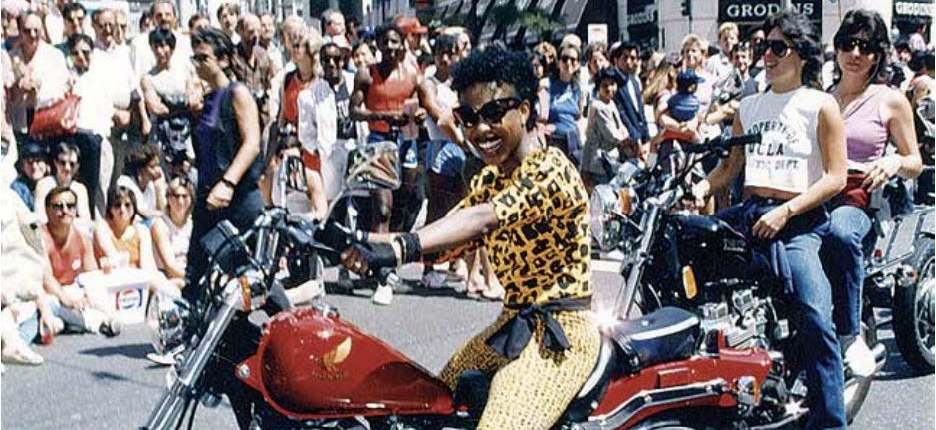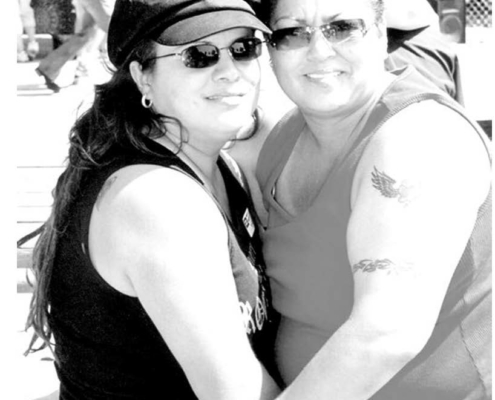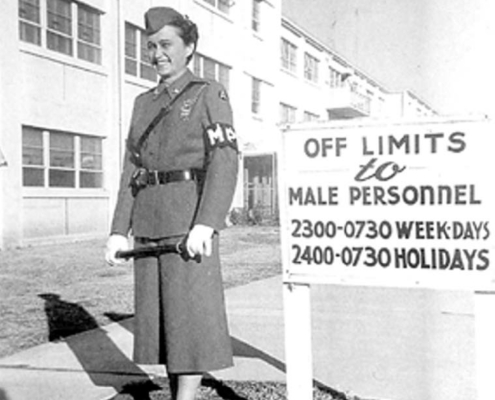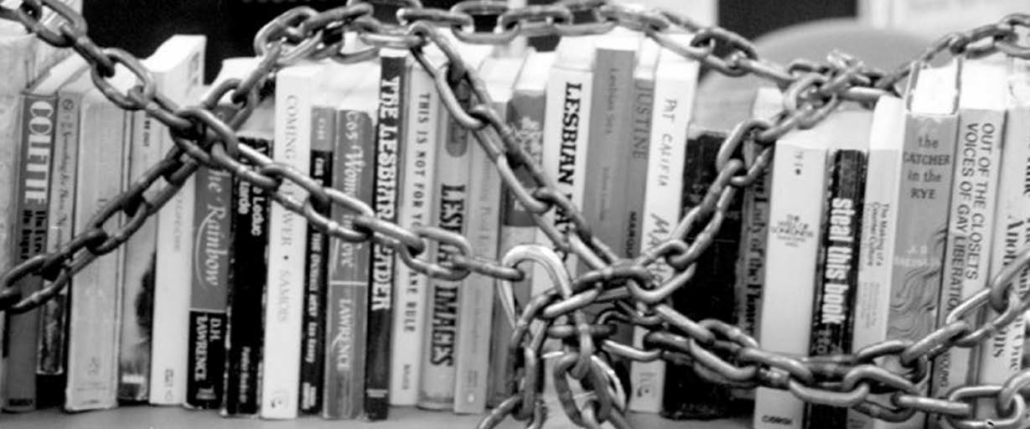Celebrating 40 Years of Empowerment: A Women’s History Month Collaboration

Motorcyclist, San Francisco, circa 1980s. Photo by Francesca Roccaforte. Francesca Roccaforte Papers, UCLA Library Special Collections.
As we honor Women’s History Month and our 40th anniversary, the UCLA Center for the Study of Women (CSW)|Barbra Streisand Center proudly highlights a special collaboration with UCLA Library, spotlighting the June L. Mazer Lesbian Archives. This grassroots archive is as a tribute to the vibrant tapestry of lesbian history, activism, and love that has thrived over the past four decades. View a selection of digitized materials found in UCLA Library Special Collections.
Spotlight on the June L. Mazer Lesbian Archives
Did you know that the June L. Mazer Lesbian Archives, nestled in the heart of West Hollywood, has been preserving the voices, stories, and experiences of everyday lesbians since 1981? Originally founded as the West Coast Lesbian Collections in Oakland, CA, by visionaries Cherie Cox, Lynn Fonfa, and Claire Potter, the archive’s acquisition policy embraced “anything a lesbian ever touched.”
In 1986, June Mazer and her partner, Bunny MacCulloch, along with other dedicated individuals, rallied to bring this invaluable collection to Los Angeles. Their grassroots efforts have become the foundation of the archives, a testament to the vibrant and diverse histories of queer and feminist communities that thrive beyond mainstream narratives.
Why “Grassroots” Matters
Grassroots archives, as defined by Jackie Goldsby, serve as the bedrock for envisioning histories often overlooked by mainstream narratives and that have undergone so much marginalization and erasure. The Mazer’s collection is a treasure trove of past traces and future imaginings that capture the essence of lesbian and feminist ways of seeing, living, writing, protesting, and most importantly, desiring and loving.
The vision and mission of the Mazer Archives reflect a commitment to providing a safe and welcoming space for the preservation and accessibility of lesbian, feminist, and women’s history. Through social activities, educational events, and research facilities, the archive fosters intergenerational connections and promotes the visibility of marginalized voices.
A Testament to Collaboration and Community
The collaboration between the June L. Mazer Lesbian Archives, CSW, and UCLA Library stands as a testament to the power of partnership in preserving and disseminating marginalized histories. This collaboration underscores the importance of collective efforts in ensuring that diverse voices are represented, preserved, and celebrated.
Reflecting on the values of courage and mutual understanding, the partnership with UCLA has been instrumental in safeguarding the stories, struggles, and joys of an intersectional lesbian community for future generations. This collaborative project embodies the spirit of community-driven initiatives, where shared goals and vision propel meaningful change.
The project’s significance extends beyond the local context, as it contributes to expanding access to primary materials for scholars worldwide. By preserving and making accessible these invaluable resources, the partnership reinforces UCLA’s commitment to fostering inclusive learning environments and advancing knowledge across disciplines.
As we commemorate the 40th anniversary of CSW through a spotlight on the June L. Mazer Lesbian Archives, we celebrate not only the achievements of the past but also an ongoing commitment to collaboration and community engagement. Together, we invite scholars, activists, and community members to participate in preserving and honoring the rich legacy of lesbian history.

Couple attending Sarafemme 2008: Queer Women of Color Music Festival, West Hollywood Park. Photo by Angela Brinskele. Angela Brinskele Papers, UCLA Library Special Collections.

MP Rita Charette enforces the no-men policy, 1958. Bunny McCulloch Papers, UCLA Library Special Collections.
“A safe place for everyday, just-trying-to-get-by Lesbians”
Ann GiAGni President of the Board, June L. Mazer Lesbian Archives
The June L. Mazer Lesbian Archives is a grassroots nonprofit organization. Up until 2007, all work–seeking and acquiring materials; processing and providing access; organizing dances, readings, panel discussions, and exhibits; producing concerts; designing and maintaining the website; and writing grants and managing office and administrative responsibilities–was done by volunteers. Like the collections of other such archives, the materials were scattered. Some were in our public space in West Hollywood. The rest filled two garages and newly arrived materials had spilled into a third garage. The organizers urged community members to donate materials and they did, and eventually the archives ran out of space. The UCLA Center for the Study of Women (CSW) was then invited the Mazer to be a community partner in the project and thus the collaboration with the university began. The Mazer Archives wanted the relationship with UCLA for clear reasons: space in their existing facility could be freed up and materials could be processed, stored in a protective environment, and made available for public access.

“Support Gay Teachers and Gay Schoolworkers” flyer was distributed in opposition to Proposition 6, known as the Briggs Initiative, which would have banned lesbians and gays, as well as those who supported the rights of lesbians and gays, from working in California schools. It was defeated on November 7, 1978. Lesbian Schoolworkers Records, UCLA Library Special Collections.
“We realized that our great strength is that the Mazer is a grassroots organization with a long history in the community. We routinely collect material from everyday, just-trying-to-get-by, lesbians. We are committed to reaching out to other lesbians who are engaged with grassroots communities and showing them that their lives have historical importance.”
-Ann GiAGni President of the Board, June L. Mazer Lesbian Archives

March against Briggs Initiative. Lesbian Schoolworkers Records, UCLA Library Special Collections.
UCLA Library has fostered an innovative project that gathers, preserves, interprets, and makes accessible collections documenting at-risk and hidden collections of personal histories and cultural artifacts of the Los Angeles region. Thanks to a generous gift from the Arcadia Fund, “Collecting Los Angeles” enables the Library to support civic engagement and to make discoverable previously hidden voices, communities, and cultures that reflect the rich diversity of Los Angeles.

Books about lesbianism, sexuality, feminism, and activism in chains. Photo by Francesca Roccaforte. Francesca Roccaforte Papers, UCLA Library Special Collections.
UCLA is a registered not-for-profit educational institution. The following clause was developed under consultation with UCLA Campus Counsel, and received special Regental approval. This language completely assures that the collection would be returned to the donor if UCLA fails to provide unfettered access to researchers regardless of their affiliation.
UCLA and the Mazer also developed and agreed to a Collaboration Agreement that helped frame how we would work together. The set of discussions leading up to the creation of the Collaboration Agreement and Deed of Gift helped frame and enable what constitutes a highly successful partnership between the June L. Mazer Lesbian Archives and UCLA Library. In addition, these documents have been used successfully as templates for similar agreements between grassroots, community-based archives and larger institutions.

From left to right, Mona Kindig, Pat Nordell, and Mary Briggs, Mission Ranch. Photo by John Williams. Pat Nordell Papers, UCLA Library Special Collections.
In 2009, UCLA Library, the UCLA Center for the Study of Women, and the June L. Mazer Lesbian Archives formalized a collection-building and preservation partnership that significantly expands access to collections held by the Mazer Archives and enriches the Library’s holdings in the important areas of lesbian and feminist social and cultural history. Working closely with the Mazer, a long-term Los Angeles–based grassroots lesbian organization, helped the Library develop a model set of agreements, which we continue to use today. These include a collaboration agreement, a model deed of gift and set of mission-critical principles that frame and guide our work together. In this essay, I will describe the importance of the model agreements and highlight several terms and clauses that ensure the sustainability and future of the Mazer Archives.

Marginalized communities have political interest in the creation, preservation, and curation of documentary material. For many activist organizations, the stewardship of these cultural resources provides verification of a shared history of repression and struggle for civil rights and equal protection. Community archives, such as the June L. Mazer Lesbian Archives, emerge from a collective awareness that limited or biased documentation is an impediment to political activism and that by ensuring an accurate archival record the group can better establish its meaning for members and society at large.

Learn more about the Mazer archives.

